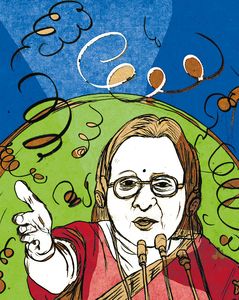Sumitra Mahajan had an unenviable task on the day of the unsuccessful no-confidence motion against the Narendra Modi government in the Lok Sabha. Perhaps, no other speaker has had a more trying time. She was trying to handle a 21st century debate by relying on rules made in the 20th century.
Speakers have a soft corner for the party to which they belong. Unlike Britain, where the speaker gives up membership of her party on election to the high office, and is traditionally re-elected without opposition to the next House of Commons, the Lok Sabha speaker does not enjoy such a bipartisan approach. They depend on the party to give them tickets, and also have to nurture their constituencies on party lines. At best, they declare that they would act without bias while sitting on the ‘High Chair’.
For Mahajan, the ferocious attack of the Rahul Gandhi-led opposition and the equally fierce defence by the Narendra Modi-led government had many tough moments. Apart from the hug that Rahul forced on Modi, she had to discipline the opposition from going too far in their speeches. The hug itself was not as dangerous as the situation faced by Mahajan’s predecessor Meira Kumar, five years ago, when an agitated Congress member L. Rajagopal let loose pepper spray in the Lok Sabha chamber, during a very noisy disruption. He belonged to the ruling party and got off without any punishment. But, he did not return to the next Lok Sabha.
When Rahul named the son of the BJP president, there was a chorus of protests. Objections were raised that he should not make negative comments about a person who could not defend himself on the floor of the Lok Sabha. This is an old rule, but it has been observed more in the breach. When sons of powerful leaders are named, this objection comes up, most prominent being the repeated allegations against Kanti Desai, son of Morarji Desai, prime minister during 1977-79. Morarji had the additional discomfort of his own party MPs joining the opposition in the allegations against Kanti.
When Rahul named RSS as an organisation he does not hate, there was even greater uproar, and BJP members appealed to Mahajan that the organisation cannot be named. Mahajan promised she would look into the records and expunge the comments from official records.
Expunging unparliamentary words and allegations is another old rule which has lost relevance in these days of live telecast of proceedings, seen by millions of viewers. This is the pitfall of live telecast, as the video recording is in public domain. However, there was much speculation on the unnamed businessman, whom Rahul accused of influencing the prime minister’s decision on the direct purchase of Rafale fighter aircraft at higher prices.
Expunction of words takes away the immunity afforded by the Constitution for both MPs and media. A member cannot be taken to court for what he has said or done on the floor of the house, as per Article 105, which gives freedom of speech to members, subject to the constitutional provisions and rules of the house. That is why what they speak should be authenticated by the record. But, no court has yet tested whether the raw footage through live telecast has precedence over the sanitised written proceedings. A similar test may one day await the channels and newspapers, as they have the umbrella of protection by the 20th century law, popularly called the Feroze Gandhi Act, which gives protection for truthful reporting of the exact proceedings. It will be a tough call for both Parliament and the judiciary to choose between order and transparency.
sachi@theweek.in


